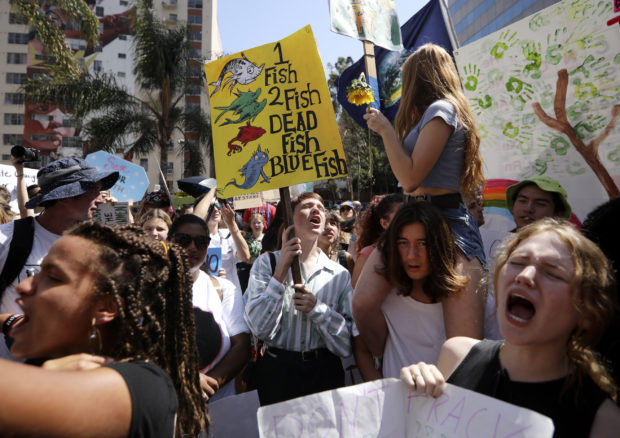NEW YORK – Around climate-change protests, tears linger. Youthful activists cite all-too depressing science and develop angst. They grieve for a future they worry they’ll never have.

A group of young protestors chant slogans and carry signs during a global climate rally at Pershing Square in downtown Los Angeles on Friday, Sept. 20, 2019, part of a wave of protests around the world. Many young climate activists say they feel hopeless and overwhelmed _ and psychologists say that’s OK and it’s good they’re talking about it. It’s sometimes called climate change anxiety and you don’t have to be an activist or young to feel it. (AP Photo/David Swanson)
Many young climate activists say they feel hopeless and overwhelmed. Psychologists say it’s good they’re talking about it. It’s sometimes called “climate change anxiety,” and you don’t have to be an activist — or young — to feel it.
“It’s really hard to grow up on a planet full of ifs,” said This is Zero Hour co-founder Jamie Margolin, a 17-year-old from Seattle, who is finding hard to buckle down and apply to colleges. “There’s always been a sense that everything beautiful in this world is temporary for my generation.”
Being young is tough and emotional to begin with. Add into that mixture a world where each scientific report — such as one that came out Wednesday — seems gloomier than the one before, and you have a recipe for anxiety.
“Coming to terms with the fact that we have lived on a dying planet is terrifying,” said 18-year-old activist Kaylah Brathwaite, a Charlotte, North Carolina college student. “I’ll give speeches and I’ll cry…. I’m just going to have to be scared for the rest of my life.”
Max Prestigiacomo of Madison, Wisconsin and the Youth Climate Action Team, said as he left Saturday’s U.N. Youth Climate Summit in New York that “climate anxiety is justified” because politicians are doing nothing.
“A lot of us say we can’t think more than 16 months ahead because we don’t know the environment we will have to grow up with,” he said.
When they meet with world leaders or testify before Congress, as Margolin did earlier this month, the students emphasize the personal toll that climate change is taking on them.
“Young people from different parts of the ward are living in constant fear and climate anxiety, fearing their future,” Komal Kumar, a youth climate activist from Fiji, told United Nations Secretary-General Antonio Guterres at Saturday’s youth climate summit.
Nowhere it was more obvious than on Monday. Usually, the most visible young climate activist, 16-year-old Greta Thunberg, gives mostly emotionless talks. At a U.S. congressional hearing she said, simply: “I don’t want you to listen to me. I want you to listen to the scientists.”
On Monday, she shed the stick-to-the-science message and frequently choked up when she scolded world leaders at the United Nations, repeating the phrase “how dare you” over and over in a highly praised address.
“You have stolen my dreams and my childhood with your empty words,” she said, later adding “We will never forgive you.”
But you don’t have to be famous or even an activist to feel it.
Adam Stater, a 15-year-old from Sewickley, Pennsylvania, wants to get more active about global warming but hasn’t yet. What he reads, he said, scares him. He wonders “if I will be able to live my life to the fullest. Will I get to be old?”
Sarah Warren, a Chicago psychologist, said she sees the anxiety as relatively widespread.
“There’s a lot of feeling that we’re cooked, and there’s an inevitability to that and that there’s not much they can do,” said Warren, who sees such emotions — even in her own children — starting in middle school and running through college.
“A sense of helplessness underlies the anxiety,” Warren said.
Many young people talk about the world having only 11 years left or some variation of that message. Climate scientists, including Victor Gensini of Northern Illinois University, say that is a common misinterpretation of a U.N. report last year that looked at the difference between two different temperature goals in fighting climate change.
People need to educate themselves on how the problem is severe but not fatal, he said.
“Climate change is a wicked problem that is going to require all of us to address, and that itself seems like an impossible mountain to climb,” Gensini said in an email. “Yet there are decisions all of us can make right now to mitigate the impacts.” /gsg